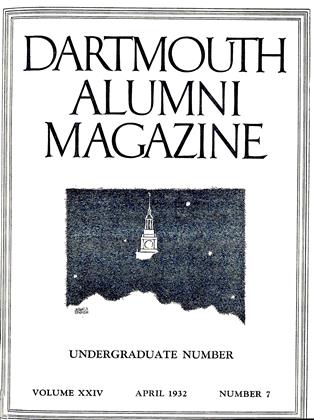NOT wholly convinced that the editorial entitled "The College Daily" which appeared in the DARTMOUTH ALUMNI MAGAZINE of December, 1931, is broad enough in scope to be honestly typical of the average alumnus' attitude toward the college newspaper, generic and specific, the editors of The Dartmouth welcome this opportunity to present their aims and to define what they believe to be the place of the paper in the college community.
Since The Dartmouth became a daily over a decade ago, it has occupied a unique position in undergraduate journalism. Because The Dartmouth is the only locally published daily in Hanover, it has had a virtual monopoly of its field. Its spotlight AP service delivers metropolitan news to Hanover several hours before city papers are available. It has enjoyed, or abused (according to your habit of mind) a very great degree of independence in its editorial and reportorial columns.
The place of The Dartmouth on the campus depends to a great extent on its timeliness. Its locus is next to the napkin at breakfast, and midway between grapefruit and coffee. For the only unfailing influence which TheDartmouth exerts is to help its readers mold the day according to their interest in what is occurring. TheDartmouth serves as the daily chart and catalogue of college activities. Broadly, its news columns serve to inform, its editorial columns seek to interpret, and its Vox Pop column exists to act as safety-valve to the entire community.
The reportorial and the editorial sections of TheDartmouth form a necessary dichotomy of expression. Accordingly, its news board members are under the influence of two coordinating credos: that of the craftsmanship of expert news-gathering, evaluating, editing, and the credo that has been embodied in the editorial policy. And between the ideals set by its editors and The Dartmouth's daily accomplishments, there is a healthy discrepancy which is none the less melancholy for being inevitable.
To recall an anonymous quotation from a bygone Dartmouth:
"News is that inexact measure with which gentlemen known as newspaper editors or journalists seek in their fumbling but usually well-intentioned fashion to chart the ebb and flow of the tides of human aspiration, the ignominy of mankind, the glory of the race. It is that curious, motley budget which, read at breakfast time, repels and shocks and fascinates, and sometimes amuses and informs." A true newsman will find in this or found on it his entire philosophy of news-gathering, or more properly, since news must be worked for, loved, and watched with pleased expectation as it develops: news fathering. In one form or another, this has been the ideal of editors since the days of Edward Bok and Joseph Pulitzer.
Practically, the news columns of The Dartmouth fly closer to hearth and earth, sufficing for fairly complete campus coverage, a compact AP summary of outstanding current occurrences in the world, as well as feature material by sports experts and by competitors for its news board. And ads. And ads.
The editorial aim of The Dartmouth (—phrased in The Dartmouth's own racy idiom) is:
"To convey faddhle-fodder to the campus by the pungent assertion of purpose, to afford entertainment to the discerning by the poised insertion of wit, to provide enlightenment for the right-minded by the interpretation of trends in politics, diplomacy, and education, and to stimulate an intelligent interest in this world, this country, and this college through the somewhat dubious medium of this column."
Actually, also, the editorial column sings smaller than it intends. Its editors frequently suspect that TheDartmouth, like many another college paper of kindred kidney and format, serves mostly as a memorandum of time, place, and occasion in which he who runs may read and discover the who, where, when of visiting lecturers, elections, and athletic contests, and that the kindly few who read its editorial column are entirely uninfluenced and unheeding except when flaws of mission, omission, or commission occur to serve as points of departure for Vox Pops.
But it has long been the solace and satisfaction of those who daily rebuild The Dartmouth to think that whatever benefits result from its existence are largely enjoyed by the men who make it. They are doubly repaid for their efforts by the pleasure of genuine and artful craftsmanship—if and when arrived at, and by their own free fellowship in fun and in responsibility. Because of the opportunity it holds out for originality, for honest, skilful writing and independent thought, there can be much profit as well as pleasure in a man's three years of work for The Dartmouth. This postulate is felt to be one of the eternal verities along the firstfloor-back in Robinson Hall, and it is this, in last analysis, which makes the college daily worth its sweat and salt.
 View Full Issue
View Full Issue
More From This Issue
-
 Article
ArticleAn Undergraduate Looks at His College
April 1932 By Howland H. Sargeant '32 -
 Article
Article"Wildcatter"—A Play in One Act
April 1932 By James W. Riley '32 -
 Class Notes
Class NotesCLASS OF 1910
April 1932 By Harold P. Hinman -
 Class Notes
Class NotesCLASS OF 1928
April 1932 By Leroy C. Milliken -
 Class Notes
Class NotesCLASS OF 1926
April 1932 By J. Branton Wallace -
 Article
ArticleThe Value of Fraternities to the College
April 1932 By Robert Coltman '32
E. H. Hymen '33
Article
-
 Article
ArticleFRESHMAN FOOTBALL
December, 1919 -
 Article
ArticleMEDICAL SCHOOL ASSOCIATION
December, 1919 -
 Article
ArticleTHE BOSTON LENTEN LUNCHEONS
May, 1922 -
 Article
ArticleCAMPUS CONFIDENTIAL
July | August 2014 -
 Article
ArticleEloquence at Gettysburg and Daniel Webster
APRIL 1967 By EARL W. WILEY '08 -
 Article
ArticleThe Faculty
JUNE 1969 By WILLIAM R. MEYER



